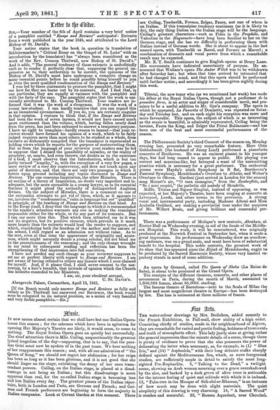lx now seems almost certain that we shall have but
one Italian Opera- house this season ; for the schemes which have been in agitation, for opening Her Majesty's Theatre are likely, it would seem, to come to nothing. The Royal Italian Opera goes on quietly but successfully. The chief attraction there is Mlle. Csillag, unquestionably the greatest lyrical tragedian of the day—supposing, that is to say, that the peer- less Grisi must now be spoken of in the past tense. We hear nothing of her reappearance this season ; and, with all our admiration of " the Queen of Song," we should not regret her abdication ; for her reign has been 'as long as it has been glorious, and it is not good that she should linger on the stage, exhibiting the decay of her once trans- cendent powers. Csillag, on the Italian stage, is placed at a disad- vantage in not being an Italian ; but this disadvantage is more apparent than real, for the so-called Italian stage is becoming less and less Italian every day. The greatest pieces of the Italian reper- toire, both in London and Paris, are German and French ; and Ger- man and French performers are beginning to form the majority in Italian companies. Look at Covent Garden at this moment. There
are Csillag, Tamberlik, Formes, Zelger, Faure, not one of whom is an Italian. If this transalpine tendency continues as it is likely to do), the only thing Italian on the Italian stage will be the language. Csillag's greatest characters—such as Fides in the Prophete, and Valentine in the Huguenots—have long been familiar to her on the German stage, and she has no difficulty in performing them with Italian instead of German words. She is about to appear in the last named opera, with Tamberlik as Raoul, and Formes as Memel; a combination of dramatic and vocal power from which a remarkable result may be expected.
Mr. E. T. Smith continues to give English operas at Drury Lane. His movements have indicated uncertainty of purpose. He an- nounced that Wallace's opera The Amber Witch was to be withdrawn after Saturday last; but when that time arrived he intimated that he had changed his mind, and that this opera should be performed until further notice; and accordingly it has been given nightly during this week.






























 Previous page
Previous page